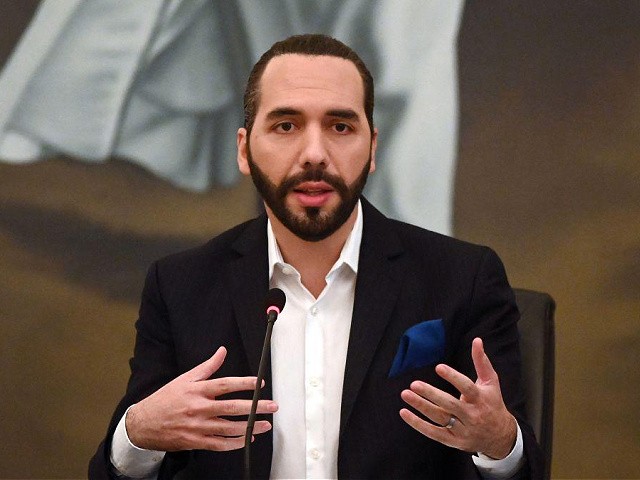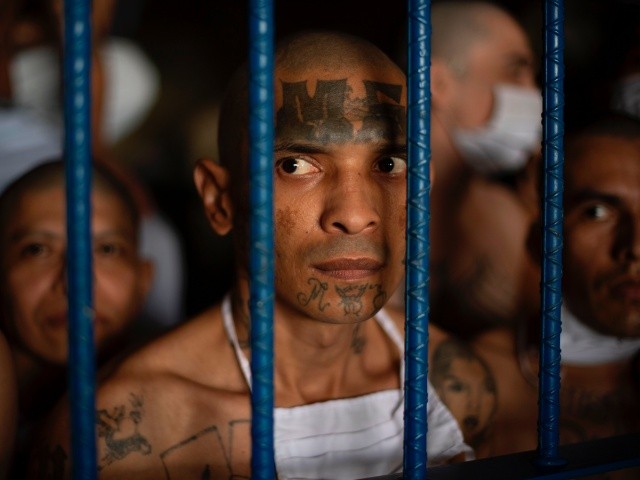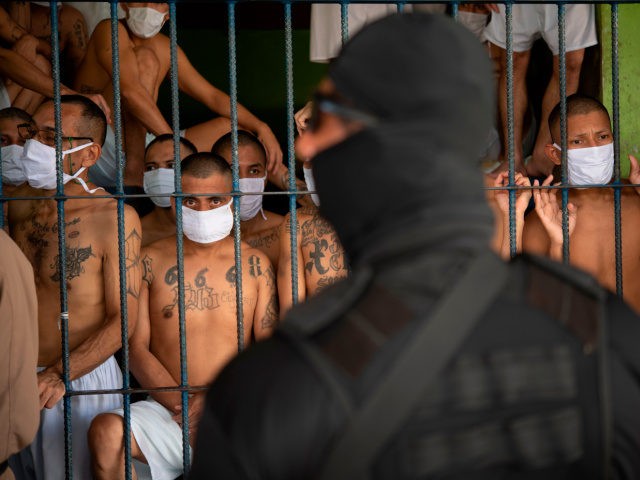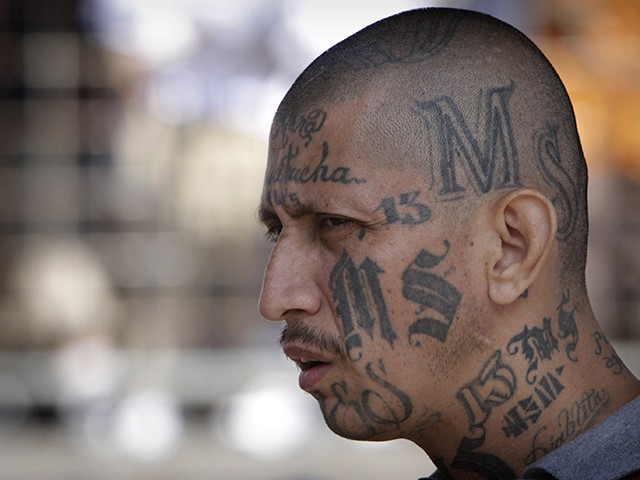The Salvadoran newspaper El Faro, which has been fiercely critical of President Nayib Bukele and his imposition of de facto martial law to combat gang violence, revealed in an extensive report this weekend that gangs have largely disappeared from many parts of the country, their members imprisoned or abroad fleeing from authorities.
Bukele, a former member of the left-wing Farabundo Martí National Liberation Front (FMLN) who was expelled and brought his own populist opposition into the presidency in 2019, has made the elimination of Mara Salvatrucha-13 (MS-13), 18th Street, and other major gangs from the country a cornerstone of his policy. El Salvador was once one of Latin America’s most violent countries, its capital routinely appearing on lists of the world’s most dangerous cities.
.@hrw has obtained a database of people prosecuted during the state of emergency in El Salvador.
It supports findings of mass due process violations, severe prison overcrowding, and deaths in custody.
Joint statement with @Cristosal: https://t.co/ua5iXSi0Uc pic.twitter.com/QPtKyuLlNq
— Tamara Taraciuk (@TamaraTaraciuk) January 27, 2023
Outside of his country, Bukele has sold himself as a savvy millennial with a love of Bitcoin and Chinese money, hoping to turn El Salvador into a tourism paradise on the back of farfetched ideas such as powering a resort city using the heat of a local volcano.
At home, Bukele announced the establishment of a state of emergency in March 2022 that effectively eliminated several basic civil rights and disabled key constitutional provisions, in particular the rights of assembly and due process. Bukele empowered police to arrest individuals with minimal evidence and flood the prisons with people, mostly young men, often not facing detailed charges. Some reports by human rights groups and local journalists accuse Salvadoran officials of abuse and torture within prisons of people for whom there was not necessarily any evidence of ties to gangs. Mass trials have become a feature of the Salvadoran prison system to process all those arrested.

Salvadoran President Nayib Bukele in San Salvador, El Salvador, on February 22, 2021. (MARVIN RECINOS/AFP via Getty Images)
The state of emergency, or “state of exception,” was supposed to last 30 days, but Bukele has had it renewed on a monthly basis and it continues through this day.
The mass arrests have required the government to greatly expand prison capacity. Last week, the Bukele government debuted a new facility named the “Terrorism Confinement Center,” designed to house 40,000 prisoners and more than doubling the country’s prison capacity. The government claims it has arrested about 63,000 people in the past year.
Bukele also led a purge within law enforcement of suspected corrupt or gang-related police officers.
#efEnglish | El Salvador seems to have destroyed the territorial reach and centralized leadership of the notorious MS-13 and 18th Street gangs. El Faro verified their withdrawal from communities across the country. https://t.co/qTUEL2OMbd
— El Faro (@_elfaro_) February 4, 2023
Bukele’s efforts, while alarming international human rights activists, have resulted in sky-high approval ratings and, El Faro revealed on Friday, freedom for many neighborhoods in which civilians were forced to pay extortion money, were banned from public parks and other critical spaces, and subject to extreme violence at the hands of the gangs.
After sending journalists into 14 previously high-risk areas of the country for gang violence, El Faro concluded, “the gangs do not exist in this moment as El Salvador knew them for decades.”
“Yes, they have ruined the gangs as you knew them. If what you mean to ask is whether there are no longer any cipotes [gang members] with presence in these places, it’s true,” an anonymous former gang leader confirmed. “They’re no longer there. If you want to see it that way, then yes: they have ruined the gangs.”
“The gangs as we knew them, as a national structure, no longer exist. What’s left is a vestige,” veteran police officer Marvin Reyes explained to the newspaper. “[They] have been left with diffuse control in a few places, barely a few tentacles attached to a few points.”

Members of the MS-13 and 18 gangs at the maximum-security prison in Izalco, Sonsonate, El Salvador. (YURI CORTEZ/AFP via Getty Images)
Neighbors in multiple communities visited stated that they were used to paying extortion money on a monthly basis but, after Bukele launched his anti-gang operation, the gangsters who typically came to collect the money disappeared. Those who banned children from using public parks and other facilities also vanished, presumably to prison or exile.
“Some communities are beginning to recover communal spaces like sports fields or parks that for decades had served as invisible borderlines,” El Faro narrated. “In the colonia Las Cañas, in the municipality of Ilopango: The leaders of both sides of the community, once controlled by rival gangs, met and even organized a youth soccer game, as part of the start of a unification process in the colonia.”
Some gang members remain in the streets, the newspaper observed, but have lost contact with gang leaders in prison and thus are either freelancing or wary of making independent moves. The anonymous gangster speaking to El Faro said many low-level gang members have lost faith in their leaders and feel that they “sold them out.”
The newspaper concluded with recognition of the reduction in gang influence in the country and concerns of what Bukele will do with all the power he has amassed after the full elimination of gangs. Human rights activists around the world similarly fear that the rights stripped from Salvadoran citizens in the name of law and order may never return under this president. The reporting of the success of the “state of exception” is particularly notable for El Faro because the newspaper has not traditionally been supportive of the president and repeated its civil rights doubts while reporting on the situation on the ground.
As recently as this September, the editorial board of El Faro referred to Bukele as a “dictator.”
“From the start, Bukele and his circle plotted to put an end to our democracy,” the editors wrote. “Their dictatorial plan involved concentrating power by seizing control of all government institutions and shutting the door on dissent, public oversight, and any possibility for alternation in power.”
The newspaper is also taking legal action in the United States in response to alleged surveillance of its journalists.
“Unfortunately we have had to look for a court in another country, because there is no possibility that in El Salvador we can obtain justice,” El Faro’s director, Carlos Dada, said in December.
Bukele responded to the report by gloating.
“This has a name: CAPITULATION!” he wrote on his preferred social media outlet, Twitter, on Saturday. “The Salvadoran opposition, its unions, its media, its NGOs, its experts — they call came out yesterday, IN UNISON, accepting the total success of our war against gangs.”
Ya no podían sostener la mentira de que El Salvador continuaba siendo un país peligroso, ni continuar negando el éxito total del Régimen de Excepción.
Han decidido replantearse su rol, atacarán desde otros ángulos, tratarán de levantar otros temas.pic.twitter.com/7pPKrqwxte
— Nayib Bukele (@nayibbukele) February 4, 2023
“They could no longer sustain the lie that El Salvador continued to be a dangerous country, or deny the total success of our state of exception,” the president continued. “They have decided to recalibrate their role, they will attack from other angles, they will raise other topics.”
Polling in February showed 84 percent of Salvadorans believe their country is heading in the right direction, according to the firm CID-Gallup.
#EnTv | Luis Haug, gerente general de CID-GALLUP comparte resultados de la última encuesta realizada.
En cuanto a la percepción sobre el rumbo del país, el 84% de la población confirma que se avanza por un camino correcto. pic.twitter.com/Vy1ixKX0bv
— La Noticia SV (@lanoticiasv) February 1, 2023
The poll, taken in the first week of February, also found that 92 percent of Salvadorans believed the security situation had improved in the country and 96 percent approved of Bukele’s performance in office related to public security.


COMMENTS
Please let us know if you're having issues with commenting.